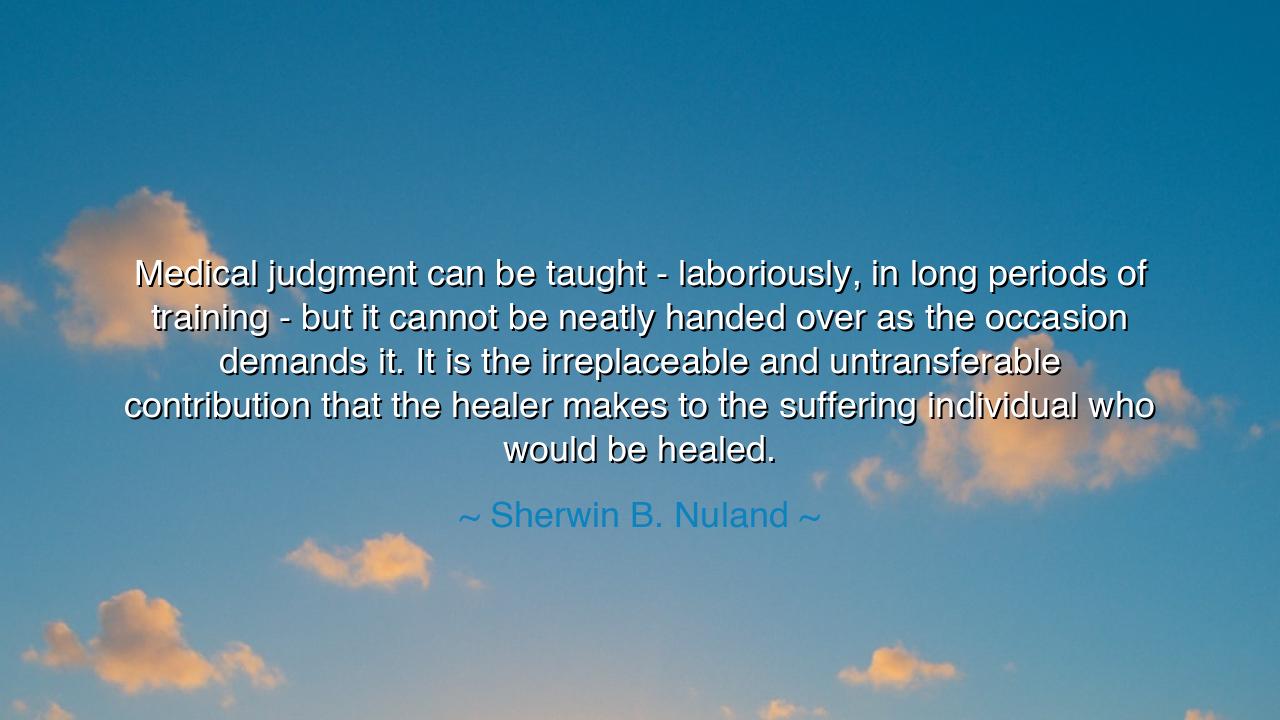
Medical judgment can be taught - laboriously, in long periods of
Medical judgment can be taught - laboriously, in long periods of training - but it cannot be neatly handed over as the occasion demands it. It is the irreplaceable and untransferable contribution that the healer makes to the suffering individual who would be healed.






When Sherwin B. Nuland declared, “Medical judgment can be taught — laboriously, in long periods of training — but it cannot be neatly handed over as the occasion demands it. It is the irreplaceable and untransferable contribution that the healer makes to the suffering individual who would be healed,” he lifted the veil upon one of the deepest mysteries of medicine: that beyond knowledge, beyond skill, there lies a sacred bond between physician and patient, a wisdom forged not in books but in lived experience and compassionate presence. His words are not only instruction for physicians, but also a hymn to the ancient role of the healer in human society.
The meaning of this truth rests in the distinction between knowledge and wisdom. Facts, techniques, and diagnoses may be taught in the halls of the university, repeated and memorized by the student of medicine. Yet medical judgment — the art of knowing what this person, in this moment, with this suffering, requires — cannot be reduced to formulas. It is a gift wrought from years of watching, listening, failing, and learning. It is laboriously cultivated, but never easily passed from one to another, for it is deeply personal, bound to the mind and soul of the healer who carries it.
The origin of such wisdom can be traced to the ancients themselves. Hippocrates, the father of medicine, taught that the physician must study nature carefully, yet he also warned that no two cases are alike. Galen, centuries later, wrote that true skill lies not in knowledge alone but in discernment — in seeing through the storm of symptoms to the hidden cause, and in weighing not just the disease, but the humanity of the one afflicted. Nuland stands in their lineage, reminding us that the suffering individual is not a case number, but a soul in need of both science and compassion.
History offers us striking examples. During the Black Death of the fourteenth century, many physicians fled in fear or clung blindly to the teachings of the ancients. But a few remained, applying their judgment with courage, learning through bitter trial how to ease suffering, even when cures were absent. Their presence saved lives not through knowledge alone, but through the careful discernment of when to intervene, when to comfort, when to risk their own lives for the sake of others. Here we see Nuland’s truth: the healer’s contribution is not reducible to formulas, but is woven into the fabric of their character.
Nuland’s words also remind us of the untransferable responsibility that falls upon the physician. In an age of technology, when machines can scan, measure, and calculate with precision beyond human reach, it may be tempting to think the machine can replace the healer. But judgment — the weighing of one life, with all its hopes and fears, against the possible courses of action — remains forever human. No device can take the place of a doctor sitting at the bedside, sensing the silent plea of the patient’s eyes, and deciding not only with the mind, but with the heart.
The lesson for us, then, is this: cultivate wisdom, not only knowledge. Whether in medicine or in any other calling, do not believe that facts alone will suffice. It is judgment, forged through time and trial, that becomes the true gift you offer to others. And this judgment cannot be demanded or handed over in haste; it must be earned, slowly, with humility, patience, and courage.
Practical actions flow from this truth. If you are a student, submit yourself to the discipline of learning, not only of books but of experience. If you are a teacher, remember that your duty is not only to impart information, but to model discernment. And if you are one who suffers — as all must, in time — know that when the healer sits beside you, their irreplaceable judgment is the fruit of years of labor meant for your sake. Respect it, trust it, and honor it.
Thus Sherwin B. Nuland’s words endure as a testament: medicine is not only science, but art; not only knowledge, but wisdom; not only training, but the mysterious, personal presence of the healer with the suffering individual. May all who hear these words remember that the greatest contributions in life are often those that cannot be transferred or imitated — they are the unique offerings of one soul to another, in the sacred encounter of healing.






AAdministratorAdministrator
Welcome, honored guests. Please leave a comment, we will respond soon